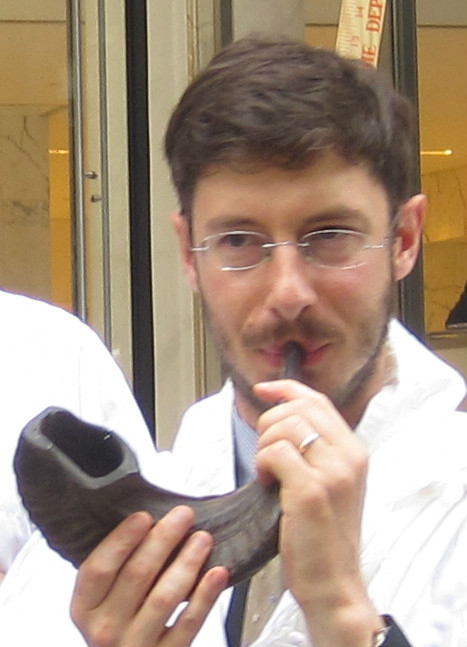Parshat Sh’lach seems, at first glance, to have two totally disconnected halves. Part one is the story of the twelve scouts whom Moses sent to Canaan and their sin that led God to decree 40 years of desert wandering. Part two is a series of laws about sacrifices, tithing, repentance, and wearing tzitzit. But a key piece of connective tissue helps us understand this parshah as a unified whole and offers spiritual guidance about Israel and the occupied Palestinian territories—the verb T.U.R.
At the parshah’s beginning, God tells Moses to send scouts, “VaYaTuRU et eretz C’na’an,” to explore (?) the land of Canaan (Num. 13:2). And at its end, we read what has since become the last paragraph of the Shma, commanding tzitzit as a corrective against our appetites: “velo TaTURU acharei levavchem v’acharei eineichem,” and do not turn aside (?) after your hearts and your eyes… (15:39).
The same word. At the beginning of the parshah, we are commanded to do it; at the end, not to do it. Two sides of a coin. What is it?
Ibn Ezra picks up on the connection, defining T.U.R. as “searching,” but this seems a little too neutral a word for the charged contexts—scouts exploring the promised land, tzitzit reminding us not to “whore after” our hearts’ and eyes’ desires. Rabbi Naftali Tzvi Yehudah Berlin, the 19th century commentator, offers an earthier explanation, using a contrast with another verb, R.G.L., that the Torah uses elsewhere to describe similar activity (whence we get MeRaGLIM, scouts; see, e.g., Num. 21:32). What distinction is the Torah making? “One who goes to see in which place one could conquer better, the word VaYaTURU is fitting, for its meaning is searching for what place is best for his purpose…Not so one who goes to a known place, solely to understand how to conquer it—the word T.U.R. is not fitting, but rather VaYeRaGeL, for he goes on foot (regel) to see the characteristics of the place.”
In other words, one who goes LaTUR has an urge and is seeking a place to fulfill it; one who goes LeRaGeL has picked a target and is casing the joint.
We can imagine the hunger with which the scouts entered the land, like kids in a candy shop: Look at this! I want that, and that, and that, or maybe that! And, indeed, the Torah does not disapprove of their enthusiasm—in fact, this desire for the land is held up as a point in their favor.
But God also knows that this id-impulse, unchecked, leads to disaster. Thus we get the parshah’s second half, culminating in the equal and opposite command: lo TaTURU. You shall not let your desires roam free. Society needs limits.
And even more crucially, it is the lo TaTURU that gets encoded in our liturgy, to be recited twice a day. Our rabbis understood human nature. It is easy to give in to desire. It is a constant challenge, requiring constant reminders, to withstand temptation and respect boundaries.
Which brings us to the occupation. I am open to believing that there is, at the heart of its origin, a kernel of beauty: a pure and all-consuming love of the land of Israel, like that of the scouts who followed God’s command LaTUR. But “all-consuming” love, by its very nature, is blind to everything but its object, including the ramifications for or destruction of those around it. That kernel is swathed in so many dark and destructive layers—racism, xenophobia, hatred, greed, indifference to the suffering of others—that its light is buried and gone. The opposite of blind devotion is love with eyes wide open—eyes that look downward at our tzitzit, remembering God’s commands, as well as outward at our neighbors. By setting limits on our national id—by making room to share the beloved land with the Palestinians, who love it no less than we do—by ending the occupation!—we can return to a more balanced national life and begin to uncover that light again.
In that spirit, we can look to an interpretation from the Chasidic tradition. The Kedushat Levi, Rabbi Levi Yitzchak of Berdichev, understands VaYaTURU as coming from a different verb root: not T.U.R. but TORaH. In other words, the mission of the scouts was not to assist with the conquest—that was so clearly in God’s hands, above their pay grade—but to Torahize the land: to study Torah, do mitzvot, and pray in it, to prepare it for the people’s arrival, for the building of the just and sacred society for which Torah provides a blueprint. That is our mission today—to re-Torahize the land, replacing the Torah of conquest and blind devotion with the Torah of justice and mercy.
Rabbi Lev Meirowitz Nelson is Director of Education at T’ruah and editor of the weekly Torah from T’ruah column.

